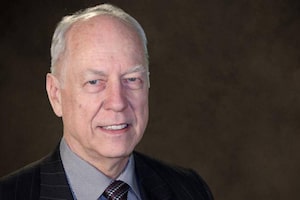Paul Heinbecker, Canada's last ambassador to serve on the United Nations Security Council, is a former chief foreign policy adviser to prime minister Brian Mulroney. He is currently with Laurier University and the Centre for International Governance Innovation in Waterloo, Ont.
It is not clear how we should fairly characterize the Stephen Harper government's current Canadian policy towards Syrian refugees, but tolerance, generosity and humanity do not come readily to mind. Regrettably, mean spiritedness, discrimination and history do. But it is not too late to do better.
The Syrian crisis is one of the worst in modern times, the largest movement of people since the Second World War. Nearly 200,000 people have been killed; 3.5 million people have fled the country and are registered by the United Nations as refugees; another 7.5 million people – half of them children – are displaced within their own country; and 12 million people inside Syria are in need, five million of them in areas that are difficult for aid agencies to reach safely. The world's response has fallen well short of the great need, and the situation is likely to get worse before it gets better. Earlier this month, the World Food Program had to temporarily suspend its feeding program for Syrian refugees because it ran out of money.
Neighbouring countries are bearing the brunt of the refugee flows; Turkey is hosting 1.6 million refugees; Lebanon, 1.2 million; and Jordan 620,000. These countries are suffering negative impacts on their own fiscal situations, and on the economic and social well-being of their own citizens as well as on the public peace as refugees clash with residents over everything from religious differences to jobs, health care, schooling, language and local commerce. Ankara, Beirut and Amman are to be commended for nevertheless keeping their borders largely open, in stark contrast to others. Some countries are responding generously – notably Germany, which has promised to accept 20,000 refugees; Sweden and Norway (with population bases a quarter and a seventh of Canada's) are taking in respectively 2,700 and 2,500. The United States has reportedly received about 5,000 Syrian refugees and is prepared to take many more and Australia has promised to take in 4,400. But some Europeans have erected, literally, obstacles to the entry into their countries of some of the most wretched on earth. And China, Russia, the U.K. and the Gulf states, notably Saudi Arabia are so far sharing little of the burden.
And Canada? In the face of what the UN has called "a disgraceful humanitarian calamity with suffering and displacement unparalleled in recent history," the Harper government has so far promised to accept just 1,300 Syrians for immigration here by the end of 2014, and has apparently actually "landed" a little over half that amount. It is redolent of the tactic of doing a little to avoid doing a lot and is almost literally the least we can do. And yet a spokesman for the Immigration Minister has reportedly claimed that "Canada remains a world leader in providing protection to the world's most vulnerable populations." Evidently, we are leading from behind.
Over the decades since the end of the Second World War, we welcomed to Canada 40,000 Hungarian refugees in the Fifties, 20,000 Czechs, Chileans and Ismailis in the Sixties and Seventies and 100,000 Vietnamese in the Seventies and Eighties. In addition to the inherent humanity of our doing so, the policy was enormously beneficial to Canada. We integrated these refugees better than perhaps any other country did, and they contributed to making Canada the successful, widely admired, diverse multicultural country it is today – and one of the world's richest. It is not obvious why we are being so reticent about Syrians, one of the best educated populations of the Middle East. If humanity is not enough of a motivation to do more, self-interest should be.
Nor are we taking in just any Syrians in need. Rather, in what appears to be a reaction to the apocalyptic rampages of ISIS, "we will prioritize persecuted ethnic and religious minorities, those at demonstrated risk, and we will not apologize for that," according to Parliamentary Secretary Costas Menegakis. Taken at face value, though, that would exclude Sunni Muslims who are a majority in minority-Alawite-governed Syria, but who have borne the brunt of the murderous Assad regime's repression. In the complex world that is contemporary Syria, in order to save minorities from ISIS, we could end up prioritizing people for refuge in Canada who have been aligned with Assad in his repression of Sunnis and others, and leaving Assad's Sunni victims in refugee limbo.
More fundamentally, picking refugees on the basis of religious faith – or excluding them on the same grounds – would risk becoming a dubious, even odious policy last seen in this country during the Second World War. Then, we accepted a grand total of 500 Jews fleeing Europe and to our enduring shame turned away the Jewish refugee-laden ship St. Louis, which returned its passengers to their fates on the Nazi controlled continent. That experience is, or should be, the compass point for every Canadian government's refugee policy. We should choose refugees in light of our capacity and their need, and on the basis of our shared humanity, not their religious creed.
 Paul Heinbecker
Paul Heinbecker